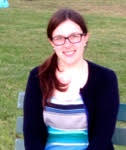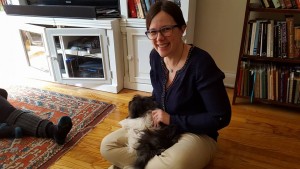Faculty Spotlight: Melissa Baese-Berk
For our first faculty spotlight, we speak with Dr Melissa Baese-Berk. Some of you might recognize her name from her recent work revisiting Neil Armstrong’s famous moon-landing quote, but she also does tons of other cool research.

Could you tell us more about your position at the University of Oregon?
I’m an assistant professor at the UO. I began my position in the fall of 2013. I have a number of other positions in the department and university. I’m also the director of the Speech Perception and Production Lab, and I’m currently the director of our Second Language Acquisition and Teaching Certificate Program and an undergraduate advisor in the department.
Why do you think the study of speech is so valuable?
I tell students in my intro classes that I really love language because it’s one of the really fundamental things that makes us human. I find speech specifically fascinating because it’s a thing that people do all the time without really thinking about it. When you start to examine the complexities of producing and understanding speech and the cognitive processing that underlie these activities, you start to appreciate how rich an area of study this is. I’m particularly interested in speech sounds because phonetics allows me to investigate interactions between biology, physics and linguistics. My work, in particular, allows me to investigate interactions between phonetic processing and other areas of representation. This study is so valuable because perception and production are not generally well understood, so there is a lot of room for important contributions in this area.
Could you tell us more about some of the research projects you are currently working on?
In my lab we’re working on a lot of projects. Most of my work looks at acquisition of sounds in non-native languages. One of the larger projects examines the relationship between speech perception and production in non-native speech. Specifically, we ask how learning in one modality influences learning in the other modality during training. The second project examines variability in non-native speech production and how this variability impacts a native listener’s ability to understand non-native speech.
In general, I get interested in most questions relating to perception, production and acquisition of speech sounds. Potential graduate students would do well to have a basic idea of what they are interested in working on that brings together some of the themes I discuss on my website. Potential undergraduate research assistants who are interested in gaining some experience in a lab can contact me for more information about how to get involved in the work of the lab.

Outside of research, what do you like to do for fun?
I have a small obsession with sports. I’m a huge hockey and baseball fan and am particularly in love with the Red Wings, the Red Sox, and the Cubs, but will watch any sport. I also really love music. Before I found linguistics, I was training to be a violinist, and I also play piano and sing. I love classical music, but also really enjoy going to see bands in a variety of genres in Eugene and Portland. My other favorite activities include: cooking, hiking, reading, knitting, crocheting, musical theater, sketch comedy, and biking.